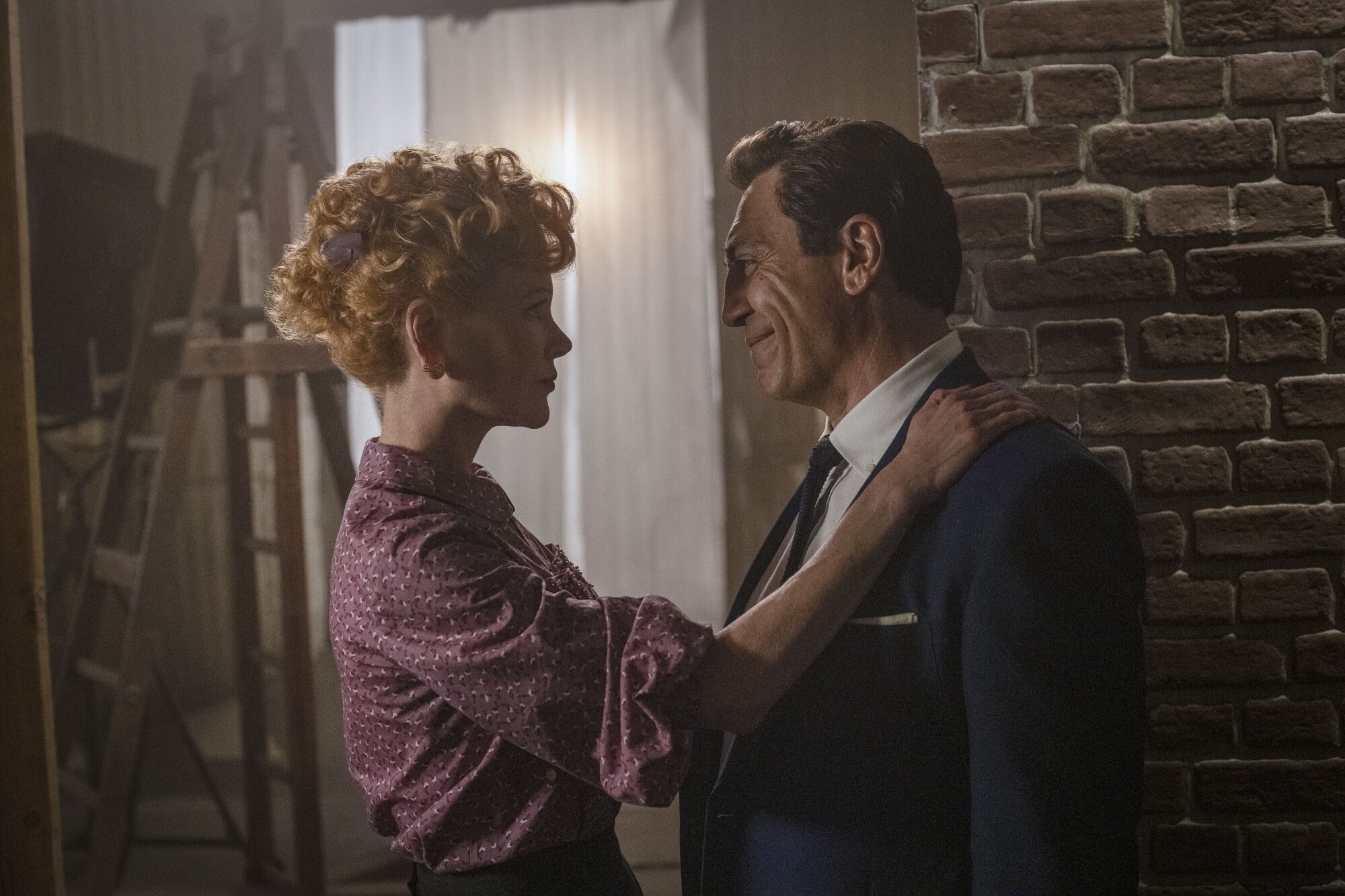Taking place over the course of one chaotic week during the production of sitcom staple I Love Lucy, Aaron Sorkin’s Being the Ricardos spins more plates than it could possibly hope to handle. Its two core ideas are thus: at the same time that Lucille Ball (Nicole Kidman) is publicly accused of being a communist, a gossip rag has published a cover story proclaiming her husband Desi Arnaz (Javier Bardem) is sleeping around. Both accusations are denied. Both threaten to derail the professional and personal lives of the couple if they prove to be true, or if they breach further into the public consciousness. With tensions high, the show must go on.
Sorkin, as he’s loved to do from his days on Sports Night through The Newsroom, takes us behind the scenes for this inside-baseball look at the mechanics of making one episode of the iconic program. We watch the actors, including co-stars William Frawley (J.K. Simmons) and Vivian Vance (Nina Arianda), read their lines and stage the scenes. We see the writers (Tony Hale, Alia Shawkat, and Jake Lacy) working through the script for the current episode while plotting out future ones. All the while the rumor mill is going in the background, threatening to topple the kingdom at any given moment.
Interesting ideas take place across Being the Ricardos. Through Ball we see how a powerful woman in this environment has to be dominant in order to assert her authority. We see how Ball essentially directs the show herself, regardless of who is technically credited on the slate. In the most engaging scenes we are taken into Lucille’s mind as she visualizes the episodes in black-and-white, putting the pieces together during brainstorming sessions with writers. She explores what works and what needs to be adjusted, with us being invited to watch that unfold as her creative gears turn. Unfortunately this enjoyable concept is only employed a couple of times throughout the film, as Sorkin sputters through a cavalcade of half-thought-out storylines stitched together with loose thread and duct tape.
Lucille takes the men on the staff through her background of affiliation with the communist party. Desi explains to Lucille, over and over again, how he wasn’t cheating on her—he was just on a boat playing cards with the boys. Vivian feels insecure about being romantically partnered on the show with a man old enough to be her father and wants to make moves to have her character be sexier, but Lucille refuses to be upstaged. Lucille wants Desi to get the respect he deserves for all of the work he does behind the scenes, but the men in charge are resistant to give that much credit to a Cuban-American. Alia Shawkat’s sole female writer in the room is putting up her own fight for respect in an area dominated by men. And, right, Lucille is pregnant and Desi is demanding they work it into the show.
Kidman admirably underplays her performance, contrasting with the broad caricature you might assume she’d reach for, but unfortunately she pushes too far in the other direction and starts fading from existence in a lot of her scenes. She feels miscast, which could certainly be said for Bardem—not for lack of charisma, which he exudes in spades. If his performance is solid, the trouble comes from the notoriously tone-deaf decision to cast the Spanish Bardem as the Cuban-American Arnaz, something made even more distracting with Sorkin’s thickheaded comments across the film’s press tour. Even without his ignorant statements, the fact that Desi’s entire narrative in the film is about his struggles to make it in Hollywood as a Cuban-American feels extremely disingenuous and uncomfortable to watch. A recurring bit where the show’s writers can’t distinguish the difference between names that are Spanish, Cuban, or Latin, so they throw their hands up in the air and include the bit in the show because those things are all the same to them, proves especially irksome.
Even running over two hours long, Sorkin can’t possibly give all of the film’s storylines the attention they deserve; thus every single one plays like afterthoughts, including the main two that get the most focus. Desi’s infidelity is completely disregarded for the entire middle section, only to awkwardly re-emerge with a jarring reveal in the final act. Adding in the inclusion of completely unnecessary talking heads, with totally separate actors playing the show’s writers in the modern day commenting on the events of the film, and a narrative that vacillates wildly through different time periods, Being the Ricardos takes what is essentially a simple concept—let’s go behind the scenes of I Love Lucy!—and complicates it beyond comprehension.
It speaks to a bad habit of Sorkin to try getting too cute with elements that don’t warrant it, but perhaps the biggest folly of Being the Ricardos is ultimately his work as a director. Three films into this shift of his career only proves less and less fruitful. With ostensibly engaging material the film somehow couldn’t be flatter. There’s no panache, no cinematic sensibility at all to make this come off the page and excite the viewer. As his script struggles to keep things on their feet, the complete absence of personality in Sorkin’s direction sinks Being the Ricardos to the point of no return.
Being the Ricardos opens in theaters on December 10, and will be streaming on Amazon Prime Video from December 21.

